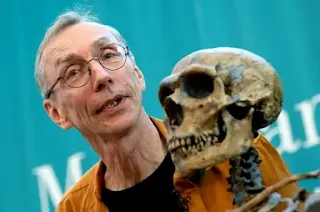 |
| Svante Paabo |
The 2022 Nobel Prize in Physiology or Medicine was awarded on Monday to 67-year-old Swedish researcher Svante Paabo.
Following his remarkable years of discovery work, which involved removing DNA from 40,000-year-old bones, Paabo was awarded the Nobel Prize.
This includes his proficiency in sequencing the genome of the extinct Neanderthal, an ancestor of modern humans.
He also succeeded in proving that there was gene transmission between homo sapiens and extinct hominins.
Paabo got the award "for his discoveries concerning the genomes of extinct hominins and human evolution," according to the Nobel Prize organization's website.
"Paabo's groundbreaking work gave rise to paleogenomics, a completely new field of study. His insights lay the groundwork for investigating what makes us distinctively human by exposing genetic variations that set all living humans apart from extinct hominins, the statement continued.
What Paabo's study accomplished was thought to be impossible, according to Dr. Nils-Goran Larsson, the chairman of the Nobel Committee for Physiology or Medicine and a professor of medical biochemistry at the Karolinska Institute in Stockholm.
Speaking in an audio clip that was broadcast on the Nobel Prize website, Paabo said his research helped him realize that there were several kinds of humans and that they had influenced modern-day homo sapiens.
"Well, it does tell us that we are very closely linked, first of all, and that we are so closely related that they have directly supplied DNA to the majority of people today, those who have their roots outside of Africa, 50 to 60 thousand years ago.
And those variations, in a way, do have an impact and affect a lot of things in our physiology today, he said.
When asked if the discovery might change how people today thought of themselves, he responded, "In some sense, I do think it does so, the sort of realization that there were other forms of humans around until quite recently, maybe 14 hundred generations or so ago, and they mixed with our ancestors and have contributed to us today.
The fact that we are the only type of humans in existence makes the past 40.000 years unique in human history. Up to that point, different varieties of humans were virtually always present.
Paabo stated in response to the work and award that he "did not imagine that this actually would qualify for a Nobel Prize," adding that he never anticipated receiving the phone call telling him of the achievement.
I was just finishing the last of my tea before leaving to pick up my daughter from her nanny, where she had spent the night, then I received a call from Sweden, and I naturally assumed it had something to do with our tiny summer home. I assumed that something had gone wrong with the lawn mower.
Paabo, one of the pioneers of paleogenetics and a professor at the Okinawa Institute of Science and Technology in Japan, was born on April 20, 1955.
He is the director of the Leipzig, Germany-based Max Planck Institute for Evolutionary Anthropology.
He received his PhD from Uppsala University in Sweden in 1986 for his studies on the immune system's modulation by the adenovirus E19 protein.
